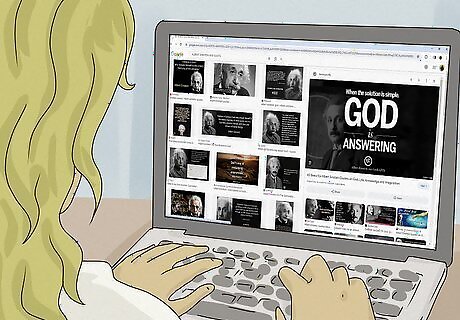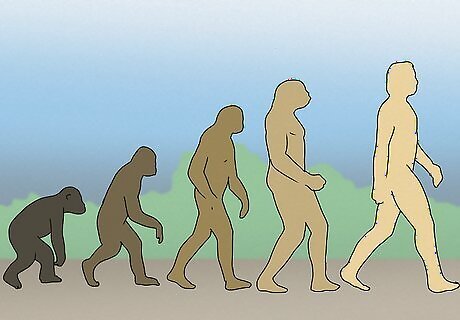
views
Convincing a Skeptical Listener

Insist that the Word of God is compatible with modern science. Remind your ideological opponent that there are no scientific theories that conclusively disprove the events mentioned in the Bible. It's possible that ancient miracles and contemporary scientific achievements only seem inconsistent with one another because the language used to explain phenomena has changed. The Big Bang Theory, for example, is often brought up to show that the teachings of Christian creationism are misguided. However, there's no way of proving that the explosion that resulted in the known universe wasn't an intentional act of creation. While it may seem counterintuitive, meeting your listener on common ground actually strengthens your position by confirming that your arguments are based on the same observations.Tip: Acknowledging the legitimacy of proven science shows your listener that you're both only interested in finding the truth.

Inform your listener about the accuracy of the Bible's depiction of Jesus. Numerous historical sources and archaeological discoveries strongly suggest that Jesus of Nazareth lived and died as the scripture tells. This may not seem like a victory in itself, but it has enormous implications. If the Bible's central figure was real, what reason is there to doubt the rest of what's written in its pages? Rather than appealing to the Bible, which your listener doesn't consider a credible source, point them towards hard scientific research, such as recent archaeological digs around Galilee and Jerusalem which have uncovered evidence of scenes described in the New Testament. For more references to the historical Jesus, cite the writings of ancient philosophers and historians such as Tacitus, Lucian, and Pliny the Younger.

Argue that God is the only satisfactory source of morality. If your listener still isn't convinced, ask them this important question: where does mankind's idea of “goodness” come from? Evolution may account for certain behaviors that are beneficial to the species, but it fails to address many moral judgments that appear to be universal. These can be a good starting point for a discussion on what it means to be a moral being. If your listener objects, ask them, “Why is it important for the species to continue?” The “survival of the fittest” explanation can't offer a satisfactory answer to this question. Even the ancient Greeks and Romans, who valued reason more than anything else, strived to realize an ideal that they called “the Good.” Such ideals hint at an understanding of a deeper purpose in life, perhaps one bestowed by God.

Challenge your listener to explain where human consciousness came from. The Bible makes it clear that God created man in his image, which explains the unrivaled power of the human mind. The same is not true from a scientific standpoint. If all organisms are continually evolving, then why have no other creatures reached a level of consciousness anywhere near that of human beings? Emphasize that the only reason you're even able to discuss the topic at hand is because humans have the ability to invent complex languages, as well as the intelligence required to understand them.

Offer quotes from influential thinkers that support your argument. Your listener may be reluctant to accept your views because they've labelled you as biased or short-sighted. They'll have no choice, however, but to recognize the wisdom of respected figures such as Albert Einstein, who is famously quoted as saying, “When the solution is simple, God is answering.” Other notable personalities who have alluded to a belief in God include Walt Whitman, who wrote, “In the faces of men and women I see God, and in my own face in the glass,” and Paul Tillich, who said, “He who knows about depth knows about God. Quotations don't constitute evidence in themselves, but they can lend added credibility to an already strong argument.
Overcoming Common Counter-Arguments

Question the logic of the Big Bang Theory. One point on which believers and atheists frequently clash is the origin of the world. The next time someone tries to tell you that the universe was created through the random activity of subatomic particles, push back by demanding to know how those particles came into being. Ultimately, you can reason, there had to be some source, and that source was the Creator. The Law of Conservation of Matter and Energy itself states that matter and energy can't be created or destroyed, but can only change form. In other words, the things that make up the physical world couldn't have come from nothing. If you need further support, pull from Bible passages like Hebrews 11:13, which states, “By faith we understand that the universe was created by the word of God, so that what is seen was not made by things that are visible.”

Note the changing attitudes on evolution in the scientific community. These days, the Theory of Evolution is often taken for granted as concrete fact. However, it's still only a theory, one that's looked upon with more uncertainty every day. Even renowned evolutionary biologists have begun expressing doubts about the truthfulness of Darwinian evolution. This pokes a big hole in many atheists' favorite go-to argument. The idea that evolution is driven by an unseen “sentient” force and not random natural selection as once thought is compelling evidence for the presence of God's will.

Remind doubters that God is not subject to the laws of nature. Brush aside atheists' complaints of a lack of evidence of God in the physical world by assuring them that the very nature of God defies observation or testing. Just because He was responsible for shaping the dimensions of space and time doesn't mean He's bound by them. God can't be put under a microscope—He can only be felt. Explain to your listener that the five senses can only receive stimuli from the natural environment, which God both permeates and sits outside of. Any argument that attempts to disprove the existence of God by physical means is a weak one.

Shift the burden of proof to the nonbeliever. Ordinarily in religious debates, it's left up to the devout party to justify their belief in God. Turn the tables on your listener by challenging them to provide proof that what they believe is true. Respond to their secular theories with questions like, “How do you know that?” and, “Can you prove that that's the case?” Prompting them to back up what they say will stop them in their tracks. If your listener is honest, they'll likely admit that their views aren't as unshakable as they originally thought. At the very least, they'll get a sense of how frustrating it is to be questioned aggressively. Be careful not to come across as though you're just being contentious.Tip: Keep in mind that the goal of your debate should ultimately be mutual enlightenment, not simply to “win.”

Suggest that blind adherence to science is a kind of religion in itself. Atheists often rely on the idea that science is irrefutable to back up their position. What they don't realize is that religious skepticism also requires a kind of leap of faith. Whenever your listener brings up a scientific theory, ask them to explain it in detail. Chances are, they can't. Note that this demonstrates some degree of unknowing acceptance on their part. Elaborate on your criticism of science as alternative faith by pointing out that your listener has only actually observed a very small percentage of what they believe in, and that the rest has been dictated to them by institutions with agendas of their own. It's also worth mentioning that much of what is commonly regarded as scientific fact is essentially just a working hypothesis. For this reason, your listener has no more claim to the validity of their beliefs than you do.




















Comments
0 comment